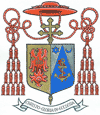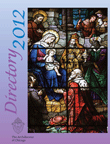
The Cardinal's Column
Francis Cardinal George, O.M.I.
Conversations in Spirituality:
religious dialogue
Cardinal's Appointments
January 29, 2007
His Eminence, Francis Cardinal George announces the following appointments:
Pastor/Dean
Reverend Lawrence Dowling, from Pastor of St. Denis Parish, South St. Louis and Dean of Deanery V-C, to be the Pastor of St. Agatha Parish, West Douglas Blvd., and Dean of Deanery III-D, effective immediately.
Administrator
Reverend Theodore Ostrowski to be the administrator of St. Denis Parish, South St. Louis, while retaining his duties as pastor of St. Adrian Parish, effective immediately.

Cardinal George's Schedule
- February 4: 2:30 p.m., Hispanic Diaconate Ordination, Holy Name Cathedral
- February 5-7: The National Catholic Bioethics Center Bishops’ Workshop, Dallas
- February 8: 3 p.m., Seminary Rectors’ Meeting
- February 9: 10 a.m., Episcopal Council Meeting
- February 10: noon, DePaul Geographic Society Lecture, DePaul University, Lincoln Park Campus
- February 12: 2 p.m., Finance Council Meeting
- February 13: 6:30 p.m., Presentation to Members of Congress, Library of Congress, Washington, D.C.
- February 15: 1:30 p.m., Consultors’ Meeting; 7 p.m., Annual Mass with College Students, St. Vincent De Paul
- February 16: 3:45 p.m., The Bernardin Center for Theology and Ministry Seminar, Catholic Theological Union
- February 17: 9 a.m., Parish Leadership Day, Maria High School
Dear Brothers and Sisters in Christ:
The Week of Prayer for Christian Unity ended this year, as it does each year, on Jan. 25, the Feast of the Conversion of St. Paul. Ecumenical dialogue has evolved in the past thirty years. Conversation about the respective beliefs of the various Christian faith communities has led to discussion about differences in doctrine that are due only to misunderstanding and into discussion about other differences that are founded on principle. Dialogue has awakened a desire to work together for social transformation and, especially in recent years, has the dialogue partners talking together about the spiritual life. Added to ecumenical dialogue with other Christians are conversations with people of non-Christian faiths. One such conversation that has taken on added urgency in recent years is that with Muslims.
Religious dialogue is rewarding, joyful and complex. Are there a few points that shape any such conversation?
First of all, we dialogue because our own faith tells us to be open to others. Otherness, plurality and diversity are richness, not threat, because our faith tells us that every other, every person, is made in God's image and likeness. This is the basis for both generosity and for dialogue, for giving to others what they need and for sharing with others what is most important to us.
It is also the basis for listening well, even when we cannot agree. A dialogue isn't possible unless both sides listen. Listening is hard; it means we can't use labels in place of thinking. It means entering into another's mental and spiritual universe, even when we know it cannot be our home. Dialogue is properly an art, not a mechanistic skill.
Those engaged in dialogue might find that one of the parties has, in fact, converted to the position of the other and finds there a new home. Conversion brings joy to the convert and to the community he or she now joins, but that is not the direct goal of dialogue itself. In fact, each party who is serious about his faith hopes and prays that the other will convert, for dialogue is a means to discover the truth of things and each dialogue partner must believe that his faith is true; but dialogue is not set up to achieve conversion as its outcome. This point respects both the freedom and dignity of each party as well as the nature of God's grace. Nevertheless, real dialogue necessarily changes each of the partners to it.
The theme for this year's week of prayer for unity among all Christ's disciples was: "He even makes the deaf to hear and the mute to speak." It emphasized common prayer to God to address together the sources of human suffering. Taking this theme to heart helps us to see the relationship between dialogue and mission.
Whenever I think about religious dialogue in the Archdiocese, I am always grateful to God, to so many Catholics here and to our many dialogue partners for the atmosphere of trust that continues to give hope for the future, however that future might look. Because the ecumenical enthusiasm of twenty or thirty years ago seems to have waned, those who have invested their lives and efforts in dialogue might be tempted to discouragement. But respect and growing affection among partners in dialogue are themselves signs of our mutual conversion to a God who is love. The closer we draw to one another, the closer we are to Christ and the more we learn to trust in his work among us. He desires our unity, and that alone is reason enough to continue along the many paths of dialogue.
The paths of dialogue give us hope because they create relationships and overcome isolation. There is a dialogue of life and common action designed to engage all those called to love the world that God has created and given to our care. There is inter-faith dialogue leading to greater understanding, and there is Christian ecumenical dialogue, which we pray will lead to greater visible unity. There is a dialogue of charity, which creates a community of friends, even when we cannot yet agree completely on religious truths.
Dialogue with others isn't possible without a strong sense of Catholic communion. Why should anyone talk unless he or she has something to say, to share? What we say as Catholics comes to from the apostolic community that unites us to Christ and witnesses to him in Scripture and Tradition. Catholics who dialogue, like those who evangelize, need to know and appreciate their faith.
Dialogue contributes to a sound spirituality; it helps form a life grounded in the eternal dialogue of three Persons in one God. A spirituality of dialogue preserves the Church from a life based on anger and outrage. Our daily prayer is always dialogue with God; and our dialogue with others includes an invitation, when appropriate, that they join that prayerful conversation. You remain daily in my dialogue with God, and I hope all of us will continue to find each other there. God bless you.
Sincerely yours in Christ,
Francis Cardinal George, OMI
Archbishop of Chicago



